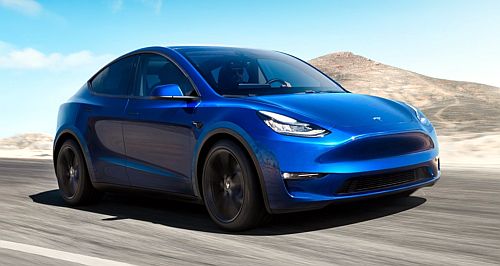Make / Model Search
News - Tesla - Model YTesla tops Toyota in Q1 global salesFSD woes remain as Model Y tops Q1 global sales and Ford-Tesla charger sharing agreed30 May 2023 By MATT BROGAN TESLA’S Model Y is the first electric vehicle to become the world’s best-selling car, beating the Toyota Corolla in the first quarter of this year, despite being almost twice the price.
In more positive Tesla news, Ford has also announced that it would adopt the electric vehicle specialist’s proprietary charging port that would grant Ford customers access to the “superior” Supercharger DC rapid charging network.
But in a twist to the ongoing saga of Tesla’s so-called Full Self Driving technology, a whistleblower has leaked a tranche of damning data about safety incidents dating back to 2015 plus evidence of internal policies designed to keep such reports from the public eye.
First, the good news. According to data sourced from Jato Dynamics, the Model Y has surpassed the Toyota Corolla and RAV4 to take the top spot, selling 267,200 units globally in Q1 2024 against 256,400 Corollas and 214,700 RAV4s. The numbers represent a 69 per cent year-on-year increase for the Model Y.
Locally, FCAI sales figures show Tesla is Australia’s seventh most popular vehicle brand with YTD sales of 14,083 (or a 4.0 per cent market share). The Model 3 is Tesla’s best-selling vehicle here and it dominates the over-$60K medium passenger car segment with 8819 deliverie to the end of April, while the Model Y has accrued 5264 unit sales within the above-$60K medium SUV sector.
Now for some bad news. Adding to reports of battery fires and autonomous driving glitches that have beset Tesla almost since day one, a whistleblower at the company leaked 100GB of data to German business journal Handelsblatt showing over 2400 cases of self-acceleration and more than 1500 braking problems relating to Tesla’s Full Self-Driving (FSD) technologies dating back to 2015.
Also among the data are accounts of unintentional emergency braking and so-called phantom stops as the result of false collision warnings.
To date, Tesla has recalled some 362,758 vehicles equipped with FSD for issues described by US National Highway Traffic Safety Authority (NHTSA) as a “crash risk”.
Further, the leaked documents state that it is Tesla company policy to keep reports of such issues “under wraps”, with any correspondence relating to the issues to be made to the customer on a verbal basis only.
“For each incident there are bullet points for the ‘technical review’. The employees who enter this review into the system regularly make it clear that the report is ‘for internal use only’. Each entry also contains the note in bold print that information, if at all, may only be passed on ‘verbally to the customer,” reported Handelsblatt.
“Do not copy and paste the report below into an email, text message, or leave it in a voicemail to the customer. Vehicle data should also not be released without permission. If, despite the advice, ‘an involvement of a lawyer cannot be prevented’, this must be recorded.”
According to Handelsblatt, Tesla responded to its queries about the data by “demanding that the data be deleted”.
To end on a more positive note; far from being the big bad wolf, it seems Tesla is preparing to pen a deal with Ford to share its Supercharger network with owners of the Blue Oval’s electric vehicles.
As part of a recent meeting between Tesla CEO Elon Musk and Ford CEO Jim Farley – who has publicly praised Tesla on multiple occasions – Ford announced that it would adopt Tesla’s North American Charging Standard (NCAS) proprietary charging port that would allow Ford customers access to Tesla’s “superior EV charging network”.
In return, and according to US publication The Verge, Tesla gets “crucial buy-in for its charging technology from one of the top automakers in the world”.
“Farley said all of Ford’s existing and future customers would get access to 12,000 Tesla Superchargers across the US. And for current Ford EV owners, Musk says an adapter is expected to be in production early next year,” reported The Verge.
In a Twitter post, Mr Farley said the ability for Ford EV customers to charge their vehicles using Tesla’s Supercharger network would greatly accelerate the transition toward electric vehicles.
“To accelerate EV adoption and make the transition successful for our customers, we must improve the charging infrastructure. (We are) excited to work with Elon Musk and Tesla to give Ford EV owners access to the Tesla charging network,” he tweeted.  Read more |
Click to shareTesla articlesResearch Tesla Motor industry news |












Facebook Twitter Instagram